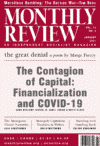Marxism

In Socialist Practice, a collection of essays on leftist theory and experiences, Victor Wallis adheres to the view that the achievement of socialism is a drawn out, nonlinear process consisting of episodes that in many cases have a mixed impact on the revolutionary cause. He analyzes several, ranging from the seven decades of Soviet rule to the New Left of the 1960s. His main thesis is that over the last century pure socialism has never existed and that on all fronts socialist movements and governments have contained elements of the old—namely, capitalism. | more…
The COVID-19 pandemic has brought into sharp relief the deep structural problems affecting nonwhite racialized workers in the core and periphery. Yet, many social scientific analyses of the global political economy, at least in the pre-COVID era, are race neutral or willfully indifferent to the persistent racial pattern of global inequalities. Even if they do address legacies of colonialism, they ignore the ongoing racial logics of oppression embedded therein. | more…

The Development of Productive Forces in Contemporary Capitalism
Capitalist modernity not only contains profound contradictions, but is also undergoing a significant transformation. Far from acting as a driving force for the development of social productive forces, it has become a parasitic entity with an essentially rentier and speculative function. Underlying this is an institutional framework that favors the private appropriation and the concentration of the products of general intellect. | more…

Encountering Marx and Joyce
“In the mid-1990s, when I lived in central London, I used to walk past the British Museum nearly every day. More often than not, I would pop in, did so for years, getting thrilled by a couple of things. The first was entering the great Reading Room, for which I had a Reader’s Card, glimpsing and even sitting in space G-7. I never ordered any books, had no need to order anything; all I wanted was to sit there, in Karl Marx’s seat, and try to feel the vibe. Usually, there was no vibe, only the hushed shuffling and page turning of others close by, mixed with the odd cough and splutter.” | more…

An Exchange from 2002–03
In December 2002, Isabel Crook, a Canadian anthropologist who had spent most of her life in China and a longtime friend and supporter of Monthly Review, wrote a letter to the MR editors questioning the critical nature of coverage of China’s capitalist road to socialism since the ascendance of Deng Xiaoping in the late 1970s. This short exchange with Harry Magdoff reflects the complex ways in which dedicated socialists sought to address changes in China and the clarity of the ideas expressed. | more…

Álvaro Cunhal's Five Days, Five Nights
A prolific political writer, Álvaro Cunhal—leader of Portugal’s Communist Party for half a century and central figure of the 1974 Carnation Revolution—revealed in 1994 that he had also written several novels under the pseudonym Manuel Tiago. One of these novels, Five Days, Five Nights, was only translated into and published in English in 2020. The novella manages to capture the complexities, loneliness, and bravery of ordinary people, highlighting how we are the ones who keep us safe. | more…

Colonialism before the First World War
The Western European powers appropriated economic surplus from their colonies, materially and substantially aiding their own industrial transition from the eighteenth century onward, as well as the diffusion of capitalism to the regions of new European settlement. In the case of India, the concept of drain is based on the fact that a substantial part of its earnings was never permitted to accrue to the country; it was instead appropriated by the ruling power: Britain. | more…

Although natural constraints on supply are important, most economic scarcities that rule our lives are actually social and artificial. Supply and demand are not natural forces drifting through the air; they are contrived realities established by an interactive social environment involving governments, corporations, institutions, and classes. Supply and demand cycles are social constructs designed to answer a basic question: Who gets what? | more…

Coexistence in Alexander Bogdanov's Utopia
Alexander Bogdanov’s Red Star, published in 1908, was an attempt to reenergize the dejected revolutionaries whose efforts had been crushed during the 1905 Russian Revolution. The protagonist, Leonid, is a Russian revolutionary chosen, in the midst of the revolution, by the Martian expedition to visit their planet and learn about the centuries-old advanced form of communism there. Since the triumph of communism in Russia was the cause to which Leonid had decided to devote his life, he agrees to visit Mars so that he can absorb their ideas and principles. | more…

Karl Marx, in Capital, focused on capital and the capitalist class that is its embodiment. It is the endless accumulation of capital, its causes and consequences that are central to Marx’s analysis. In taking this approach, Marx tended to obscure not only the centrality of capital’s “immanent drive” and “constant tendency” to divide the working class but also the political economy of the working class (“social production controlled by social foresight”). In Between Capitalism and Community, Lebowitz demonstrates that capitalism contains within itself elements of a different society, one of community. If we are to escape the ultimate barbarism portended by the existing crisis of the earth system, the subordination of the system of capitalism by that of community is essential. | more…

We are extremely pleased to announce that John Bellamy Foster, editor of Monthly Review, has won the prestigious Deutscher Memorial Prize for 2020 for his The Return of Nature: Socialism and Ecology. | more…

A new poem by Marge Piercy. | more…










